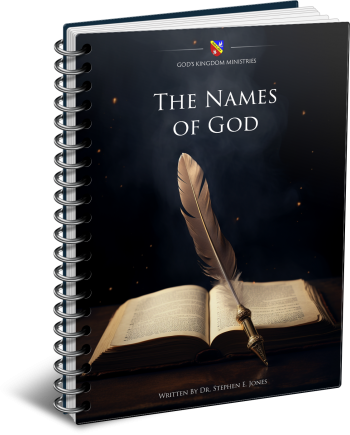Latest Posts
View the latest posts in an easy-to-read list format, with filtering options.

God has revealed His primary name as Jehovah (or Yahweh). But there are 12 variations of Jehovah that reveal specific aspects of His nature so that we can get to know Him.
Category - General

The final Jehovah name comes from the New Testament. It seems that others have missed this name because it is written as “The Lord is My helper” (Heb. 13:6). When most translations of the Old Testament render Jehovah as “Lord,” the commentators have no trouble correcting this to read Jehovah, Yahweh, or something similar. But when the New Testament uses the term “Lord” (kurios), usually quoting from the Septuagint Version, they miss the fact that this is the Greek translation of Jehovah.
Most likely, they miss this connection because kurios has a dual application. It does not always refer to Jehovah but also to lords among men. So, for instance, we read in Luke 16:5 KJV, “So he called every one of his lord’s debtors unto him.”
In the Hebrew Old Testament, we often read how people used the respectful term “my lord” in referring to men. So we read of “my lord, Esau” in Gen. 32:4. When Abraham approached the sons of Heth to buy a burial cave for Sarah, they answered in Gen. 23:6, “Hear us, my lord, you are a mighty prince among us.” In both cases, the Hebrew word used is adon, not Jehovah, but the Greek Septuagint translation of the Hebrew Old Testament translates it as kurios, which, in turn, is normally translated into English as “lord.”
So we see that the Greek word kurios was the common translation of both adon and Jehovah and could therefore refer to either God or noblemen.
This somewhat confusing situation carried into the New Testament as well. This means we must look at the context to see if “lord” refers to men or to God.
In Heb. 13:6 we read, “The Lord is my helper, I will not be afraid.” It is clear that “Lord” applied to Jehovah, for it was taken from Psalm 10:14, “You have been the helper to the orphan.” Therefore, I believe that this is the 12th subset of the name Jehovah. Those who see only ten subsets of Jehovah think of ten as a number of completion. I see 12 subsets as the completion number of divine government. It is not a crucial point, of course, but in my view, it clarifies the point that Jehovah, the God of the Covenant, is the King who rules His people.
Heb. 13:6 asserts that Jehovah is our “Helper.” What exactly does that mean? There are many ways to help us, but this appears to have a specific application. If we look at the context, we obtain a narrower view of “Helper.” Heb. 13:5, 6 says,
5 Make sure that your character is free from the love of money, being content with what you have; for He Himself has said, “I will never desert you, nor will I ever forsake you,” 6 so that we confidently say, “The Lord is my Helper, I will not be afraid. What will man do to me?”
Psalm 10:14 applies this specifically to orphans, saying, “You have been the helper of the orphan” (yatom, “fatherless, orphan”). The word comes from a root word that means “to be lonely.” So Jehovah-Boethos in this case refers to God as a Father who will never abandon His children. More than that, He is a Father to the fatherless.
David himself knew this side of God, for when he fled from Saul and lived as an outlaw, his parents were forced to renounce him and abandon him, lest they too would be persecuted. David wrote of this in Psalm 27:10,
10 For my father and my mother have forsaken me, but the Lord will take me up.
Fathers normally had power of attorney in their family. The technical term was a kinsman redeemer, usually mistranslated as “avenger of blood.” The kinsman redeemer was the one responsible to protect the family from injustice, and in case of internal disputes, he was the judge or arbitrator between the two parties.
Widows and orphans, however, often had no one to be their advocate in court. They were often victims of injustice, as many took advantage of them and oppressed them. Exodus 22:22-24 says,
22 You shall not afflict any widow or orphan. 23 If you afflict him at all, and if he does cry out to Me, I will surely hear his cry; 24 and My anger will be kindled, and I will kill you with the sword, and your wives shall become widows and your children fatherless.
In other words, if a widow or orphan is oppressed and has no advocate to help, then God Himself will be their Advocate. David recognized that God was his Advocate. An advocate is also referred to as a “comforter,” as we see in Isaiah 40:1. In the New Testament, we see that our Comforter is the Holy Spirit (John 14:26, KJV). The Greek word is parakletos, which the NASB renders “Helper.” The word literally means one who is summoned (to help), one who is called to one’s side, especially in a court of law.
Boethos is literally boe, “a cry,” and theos, “God.” It means a cry to God, an appeal to God for help. That, of course, describes a situation where the Jehovah-Boethos, comes to our aid in the form of the Holy Spirit. The Holy Spirit also represents Christ, for Christ called Him “another Comforter” (KJV) or “another Helper” (NASB), assuring the disciples in John 14:18 that “I will not leave you as orphans; I will come to you.”
So Jehovah-Boethos is primarily the God of widows and orphans, those who lack an earthly advocate to cover them and protect them from injustice, harm, or lack of provision. He is also the God of those who have been orphaned by the church. Even if the church rejects people, this does not mean (as they often claim) that these rejected ones are “lost.” Instead, it means that their Advocate has changed, because they are now among the fatherless.
The early church was cast out of Judaism and became legally fatherless in that sense. But they had an Advocate, a “Helper,” who had been given to them on the day of Pentecost. All of the injustice perpetrated upon the early church suggested their fatherless condition, but this only enhanced their status with Jehovah-Boethos Himself.
On a more personal level, many today have been fatherless in one way or another. Either their father has died, or their father has neglected or abandoned them altogether. Often their very concept of a father conjures up a negative emotion. Such people need to know God as their heavenly Father, one who does not abandon them as orphans.
As the law says, those widows and orphans who call upon Him will surely be heard, and God will indeed hear their prayer. Unfortunately, many of these remain unaware of God’s law and do not know the name of Jehovah-Boethos. Hence, they often do not feel as if God has heard their cries. But the word of God itself assures us that He does indeed hear their cry. He takes up their cause as the Advocate and Kinsman Redeemer.
Let this be of comfort to all of the fatherless children in the world today.